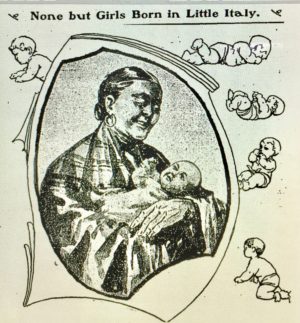After 70 years in Italian America, I am still searching for the “Queen of Little Italy.” No, she’s not one of those lovely young ladies who reign over the Columbus Day Parade. My queen was short and stout and tough, and she packed a gun. She died in 1920.
In her day, she controlled more votes than any other woman in Chicago. She was a midwife who delivered her voters into the world at their birth and to the polls on election day. She was a strong leader who in her time defied every stereotype of women, Italians and immigrants.
We have a tantalizing amount of information about my Queen of Little Italy. Anthony Maro did an excellent sketch of the life of Anna Carlo-Blasi based on genealogical sources and news clips in our “Italian Women in Chicago: Madonna Mia! QUI debbo vivere?” and I have done some additional research. I even travelled to the tiny village of Omignano (Salerno), where she was born. No luck there — a few municipal records of her birth, etc., but no one in her hometown in 2017 was aware that Omignano had produced the queen of Chicago’s Italian immigrants. There was some interest, especially from vice mayor Pasquale Feo, and maybe someday there will be a memorial plaque to Blasi in the village.
Here’s a summary of what we have so far: Born Luigia Anna Chiariello in 1869, she migrated to the U.S. in 1887. Two years later, she married Joseph Carlo, who operated a saloon in partnership with his brother-in-law, Frank Taglia. The Carlos had two children, Antonio and Cecilia. In the 1890s, she was active as a midwife, as a leader in several of the dozen Italian mutual benefit societies of which she was a member and as a driving force in First Ward politics. Allied with the infamous Bath House Coughlin and Hinky Dink Kenna, she gained a reputation as a friend and mediator who could help find jobs and get city services from the pols. Living in a rough neighborhood, she became the first woman in Chicago to take out a gun permit. Apparently she needed the gun; her husband was stabbed to death in a quarrel in 1908.
After only 16 months, Anna Carlo married Joseph Blasi, a First Ward Republican precinct captain, in an elaborate ceremony at Old St. Peter’s Church attended by many prominent elected officials. Apparently, the Blasis developed some personal ambitions for elective office. In June 1913, the big news in Illinois was the passage of women’s suffrage. Almost from the moment she became eligible to serve, Anna Carlo-Blasi announced her intention to run for alderman. Newspapers around the country breathlessly carried the story, and then, nothing. No mention of her withdrawal or explanation of what happened. Her name seems to have vanished from the Chicago print media until her death in June 1920. Thousands attended her wake and funeral. Among the honorary pallbearers were current Mayor William Hale Thompson and former Mayor Carter H. Harrison.
This fascinating slice of history raises as many questions as it answers. What element in her Italian personality led the newspapers to dub her “The Queen of Little Italy?” She was a contemporary of both Mother Cabrini and Jane Addams, working with Italian immigrants in Chicago. What, if any, were their relationships? How was she touched by the corruption of First Ward politics? And finally, what happened after she announced her intention to run for alderman? She seemed to have fallen off the face of the earth. And why is so little known about her today?
I know it’s a long shot, but I am appealing to Fra Noi readers to help me find further clues that will lead to a complete rendering of Anna Carlo-Blasi’s amazing story. Email me at Dominic.Candeloro@gmail.com.
The above appeared in the July issue of the print version of Fra Noi. Our gorgeous, monthly magazine contains a veritable feast of news and views, profiles and features, entertainment and culture. To subscribe, click here.
 Fra Noi Embrace Your Inner Italian
Fra Noi Embrace Your Inner Italian







